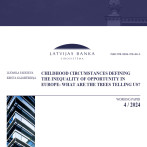A champion's leap in retail trade in the first quarter
In the first quarter of this year, retail trade demonstrated a leap worthy of a champion, which, against the modest macroeconomic indicators, looks particularly striking. Compared to the first quarter of 2014, sales volumes increased by 7.5%, and, compared to the fourth quarter, by 2.6%. The substantial annual rate of growth is to a great extent explained both by the low base last year – smaller purchases a year ago and after the introduction of the euro. Yet the rise may have been determined also by other factors:
- Disposable income is growing. Official data on the changes in average salary are yet to be available, but the currently available operational data (including the paid taxes) show a further growth in the compensation funds – approximately 6-7% year-on-year.
- Consumer confidence is on the rise in Latvia for a third consecutive month and currently it is at its highest point since 2007. That means that the population has confidence in the next day and are ready to channel more for expenditure, without making rainy day accruals.
- The warm winter had a positive effect on the purchasing power of the population. Even though initially a negative effect of the liberalization of the electrical power market was predicted, which, however would have been compensated to low income families by benefits, it was compensated even more by the warm weather, which reduced heating costs.
- A significant part of the growth of the retail trade turnover is contributed by the rise in the sales of car fuel, some of which can be accounted for by the rise in legal fuel turnover and contraction of the gray economy. Such a dynamic is confirmed by fuel traders. Chairman of the Executive Board of the Fuel Traders Association Mārtiņš Stirāns estimates that the consumption of legal fuel has increased by 5%, explaining it mostly by a drop in oil prices, which reduced the search for contraband fuel. Overall, the drop in the price of oil has also been a factor that has a positive effect on purchasing power, which, however has changed its dynamic toward the end of the quarter in the direction of price rises.
- The Latvian presidency of the European Union Council in the first six months of 2015 helps to maintain visits and purchases by foreign guests. This factor probably cannot fully compensate the other negative influences in the tourism sector. On business trips, guests are not so keen on spending; moreover, because of a dropping purchasing power, the number of Russian guests has dropped substantially – they used to be fond of visiting shops in Latvia, particularly concentrating on designer clothes, jewellery, household appliances, and designer objects.
The above may be the main but not the only factors that have impacted trade. We can claim with a relatively high degree of certainty that next quarter we will not see such a great growth. If, in the first quarter, the comparative base was low as a result of the impact of the euro introduction on the population's spending, in the second quarter, the situation will be reversed: the base for comparison will be high. In April of last year, because of the warm Easter, trade turnover had an almost skyrocketing rise; this year, the Easter holiday was cool and the population therefore travelled less in Latvia, bought less fuel, had fewer picnics and purchased fewer pairs of sunglasses.
The year 2015 will fluctuate month to month, but will ensure growth of about 4%. The other trade sector components, e.g., the sales of and wholesale trade in automobiles, where many prediction lowering factors and risks – primarily connected to the uncertainty in the external markets – will be at work, may have growth that is not as high, and the total growth in the sector could be closer to 3%.
Textual error
«… …»






